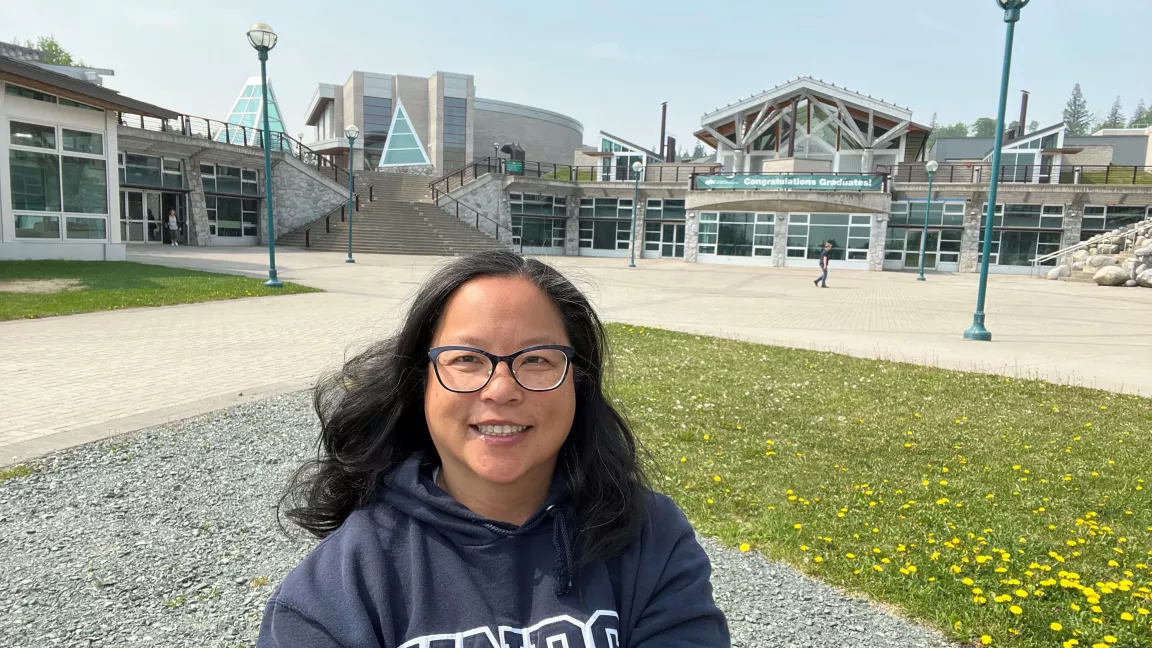Learning to embrace identity
Her journey as an educator has provided UNBC's Dr. Christine Ho Younghusband with learning opportunities to explore culture and make connections - not only with others, but with herself.

The following reflection has been written by Dr. Christine Ho Younghusband, an Assistant Professor in UNBC’s School of Education. We are grateful to Dr. Ho Younghusband for being willing to share portions of her story with us as we look for ways to recognize, acknowledge and honour Asian Heritage Month at UNBC.
I am a second-generation Chinese Canadian cis-gendered woman. I was born and raised in Prince Rupert, B.C. and I am the youngest child of three. I have an older sister and twin brother. My parents immigrated to Canada on the point system from Hong Kong. My dad worked at the pulp mill and my mom worked in the cannery, pulp mill cafeteria, and the food industry. My parents came to Canada with my sister for a better life. In doing so, I was culturally assimilated.
I don’t speak Cantonese and I understand very little of my heritage and Chinese culture with exception to food, birth order and the importance of gender. I am “number three.” I’m not sure if I would consider myself to be a model minority, but I hate the word “Oriental” and I denied my ethnic identity for many years to belong. No matter how non-Chinese I tried to be, it did not protect me from stereotypes, racism and acts of hate. I struggled with my identity.
Teaching in K-12 schools offered many learning opportunities for me to explore culture and make connections. One of those opportunities was implementing the Math 8/9 curriculum 15 years ago and collaborating with the Aboriginal District Principal to create a math project called Math Embedded: A Tribute to Susan Point. The project integrated Indigenous education, math education and art education. Including culture made math accessible and inclusive.
I learned more about Indigenous worldviews and ways of being from participating in the Pulling Together Canoe Journey, working with Indigenous educators and learning from Indigenous artists, Elders and scholars. I feel connected when I weave, bead or drum. Bringing these experiences to the School of Education with the UHNBC drummers, Indigenous scholars and educators, and activities in the school district can help teacher candidates to develop their understandings.
I am new to this territory and I am learning about the Lheidli T’enneh: the people, place and land. I am also learning about the history the Chinese in northern B.C. as part of railway, gold rush and canneries. My parents were a part of a Chinese community in Prince Rupert, and my mom must have learned from local Indigenous Peoples in Prince Rupert because she was gifted crab and salmon, she canned salmon and abalone, and she fried ooligans. Truly delicious.
Coming to UNBC and the School of Education after completing my doctorate and taking care of my mom before she passed away was like returning home. I return to some of these memories. After the death of George Floyd, I could no longer pretend, hide or deny who I am. I was called to question. During the pandemic and recent Canadian politics, anti-Asian and anti-Chinese hate are on the rise. I experienced micro-aggressions, lateral violence and racialized bias.
Representation and diversity are important in K-12 education and teacher education. When I was a student and teacher in K-12 schools, I had one Filipino teacher, one Chinese colleague and one South Asian vice-principal. Currently, I am the only Chinese faculty member. Students need to see themselves in schools, teachers and leadership. In my work, I create “third spaces” or safe places for students of colour, Black students, Indigenous students and the marginalized.
I am currently co-writing and co-presenting with a recent graduate from teacher education talking about our experiences as Asian women educators in B.C. schools. I have also worked with a recent Master of Education graduate of South Asian heritage who teaches in B.C. schools and researched about the school experiences students of Punjabi Sikh ancestry. They are graduates of UNBC’s School of Education, activists in education and passionate about their heritage and rights of students.
Asian Heritage Month brings new meaning to me each year as I begin to learn more about Chinese Canadians and their contributions in northern B.C., but also about myself and my ethnic identity to decolonize my practice and deepen my understanding of local indigenous Peoples, knowledges and ways of being. I am more accepting of who I am as a second-generation Chinese Canadian woman. I am proud of my parents and siblings. I am proud to be myself.